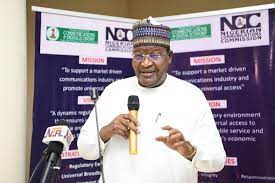According to the Nigerian Communications Commission (NCC), Nigeria has ranked as the seventh most popular country for the use of mobile phones worldwide and the eleventh most popular country for internet penetration.
Umar Danbatta, Executive Vice-Chairman of the NCC, disclosed this information on Thursday in Abuja during the “Emerging Technology Forum,” which was attended by several stakeholders in the telecommunications business.
According to Danbatta, the worldwide data gathered by the team behind the Network Readiness Index (NRI) indicated that digital transformation was a global need in order to optimise the social and economic benefits of the digital era. This was demonstrated by the fact that the NRI team collected this data from all over the world.
Abraham Oshadami, Head of Spectrum Database Management for the Commission, spoke on behalf of Danbatta and explained that the NRI assessed the performance of 131 economies based on technology (infrastructure), people, governance, and effect.
NRI is a guiding statistic that evaluates the part that information and communication technology (ICT) plays in society as well as its effects.
Read also: NCC encourages Nigeria telecom sector to embrace clean energy
Remark
According to him, Nigeria is a telecommunications powerhouse, accounting for 82% of the continent’s telecom subscribers and 29% of the continent’s internet consumption. He mentioned this in reference to the country of Nigeria.
“Our country ranks eleventh in the world for internet penetration and seventh in mobile phone usage. The NRI team’s global data shows that digital transformation is a global imperative for maximising the social and economic effects of the digital era.”
“Despite these remarkable metrics, our Network Readiness Index ranking for 2022 of 109th out of 131 countries is both humbling and challenging.”
Nigeria’s position in Africa on internet usage
The level of freedom enjoyed on the internet in Nigeria is among the highest in Africa. According to an analysis of three main categories, namely hurdles to access, limits on content, and abuses of user rights, Nigeria is currently ranked fifth in Sub-Saharan Africa. This represents a modest drop from Nigeria’s previous position, which was fourth in the region. Nigeria has a huge online audience since it has one of the youngest populations in the world while also having one of the largest populations.
The number of people who use the internet is estimated to be over 109 million, despite an internet penetration rate of approximately 51 percent. Mobile internet penetration in Nigeria is quite high, which is an interesting facet of the country’s widespread use of the internet. In Nigeria, mobile devices are responsible for producing more than 84 percent of all internet traffic. On the other hand, this could suggest that you do not have the necessary hardware to make full use of the internet.
NCC to strengthen quality service regulations in Nigerian telecom sector
Social media usage in Nigeria
It is possible that there is a lucrative market for social media in Africa, given the continent’s widespread use of mobile internet and some of the highest smartphone ownership rates in the world. As of the year 2022, there were approximately 33 million people using social media in Nigeria. Facebook and WhatsApp are currently the most widely used social media platforms. After that came Instagram and then Facebook Messenger. Unsurprisingly, the biggest percentage of social media users in Nigeria were people in their twenties and thirties.
The gender gap in internet usage in this country is an intriguing demographic aspect that may be seen in this country. According to the findings of an analysis of the audience for Internet advertising, the proportion of male viewers is significantly larger across all age ranges. There were even two times as many male users of social media as there were female users in certain age groupings.




